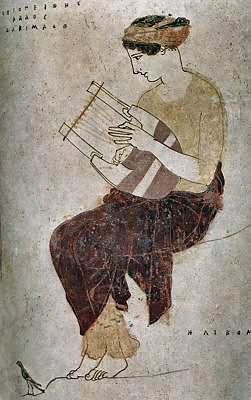Jade stairs complaint
Li Bai
701-762 CE
(translated by William P. Coleman)
The jade stairs give birth to clear dew;
in the late night it permeates gauze stockings.
Yet she lowers the crystal curtain;
jewel pendants tinkle, and she looks to the autumn moon.
![]()
. I found the Chinese text and an English translation of this poem — along with the word-by-word literal translation I used to create this one — and very helpful notes — on pp. 105-6 of Whincup, Greg. The Heart of Chinese Poetry. Garden City: Anchor Press, Doubleday, 1987. ISBN 0-385-23967-X.
I found the Chinese text and an English translation of this poem — along with the word-by-word literal translation I used to create this one — and very helpful notes — on pp. 105-6 of Whincup, Greg. The Heart of Chinese Poetry. Garden City: Anchor Press, Doubleday, 1987. ISBN 0-385-23967-X.
![]() Also at Chinese Poems.
Also at Chinese Poems.
 There are also translation materials for this poem at the website Tang Shi — 300 Tang Poems, from Wengu — Chinese Classics and Poems.
There are also translation materials for this poem at the website Tang Shi — 300 Tang Poems, from Wengu — Chinese Classics and Poems.
 And on p. 278 of Wai-Lim Yip’s book Chinese Poetry: an Anthology of Major Modes and Genres, Duke University Press, 1997; ISBN 0-8223-1946-2.
And on p. 278 of Wai-Lim Yip’s book Chinese Poetry: an Anthology of Major Modes and Genres, Duke University Press, 1997; ISBN 0-8223-1946-2.
The grammar of Chinese allows poets to leave interpretive choices open, and it’s an unattainable ideal of translating to bring out possibilities without closing others. I try to use my sense of English to at least intrigue you. If I’ve succeeded, it’s best — even if you don’t know Chinese, which I don’t either — to follow up at the source I cite above and see the original word-by-word translation from which I worked. It’ll be richer than what I’ve given you. To understand the poem best, try to construct your own translation.
![]() More Chinese poetry translations in this blog.
More Chinese poetry translations in this blog.
![]() Home page for my Li Bai translations.
Home page for my Li Bai translations.








I liked it, then I read the other translation, which was hard to believe is a translation of the same poem :) (I don’t know Chinese)
May be, the other one was creating more detailed pictures but this translation has more of what I am looking for in Chinese poetry.
Thanks
Karo
good translation, exactly caught the spirit.
“she” is a good insertion to the originally wording.
original…sorry for the auto-spelling.
Studied Chinese extensively. This poem has inspired many great translations: luv it. However, have to quibble with the propensity to ignore the first characters in the third and fourth lines: ch’ieh, which indicates regret; and ling lung which is onomatopoeia for the tinkling of jade (William Cohen gets it at top). According to commentators, this lady lives in the palace “harem” and is disappointed when the emperor does not visit her (again). Lowering the screen is to give up and go to bed alone and lamenting. So sad. There’s no “correct” translation and it’s amazing that centuries later, so many translators have different translations.